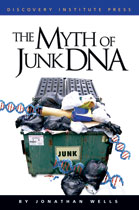 Intelligent Design
Intelligent Design
ENCODE Results Separate Science Advocates from Propagandists
 “I must say,” observes an email correspondent of ours, who is also a biologist, “I’m getting a kick out of watching evolutionary biologists attack molecular biologists for ‘hyping’ the ENCODE results.”
“I must say,” observes an email correspondent of ours, who is also a biologist, “I’m getting a kick out of watching evolutionary biologists attack molecular biologists for ‘hyping’ the ENCODE results.”
True, and equally enjoyable — in the sense of confirming something you strongly suspected already — is seeing the way the ENCODE news has drawn a bright line between voices in the science world that care about science and those that are more focussed on the politics of science, even as they profess otherwise.
An article in Science by Elizabeth Pennisi offers an illustration of the former — science writing that’s about science — pulling no punches and offering no apology for making it unambiguous how big the ENCODE results really are.
This week, 30 research papers, including six in Nature and additional papers published by Science, sound the death knell for the idea that our DNA is mostly littered with useless bases. A decade-long project, the Encyclopedia of DNA Elements (ENCODE), has found that 80% of the human genome serves some purpose, biochemically speaking. “I don’t think anyone would have anticipated even close to the amount of sequence that ENCODE has uncovered that looks like it has functional importance,” says John A. Stamatoyannopoulos, an ENCODE researcher at the University of Washington, Seattle.
Beyond defining proteins, the DNA bases highlighted by ENCODE specify landing spots for proteins that infl uence gene activity, strands of RNA with myriad roles, or simply places where chemical modifications serve to silence stretches of our chromosomes. These results are going “to change the way a lot of [genomics] concepts are written about and presented in textbooks,” Stamatoyannopoulos predicts.
Get that? It’s the “death knell” of junk DNA. The title of the article, “ENCODE Project Writes Eulogy for Junk DNA,” is not one bit less forthright than the title of our own Jonathan Wells’s Myth of Junk DNA, which (prophetically) appeared in print more than a year before the ENCODE “flotilla” of articles (as another biologist friend aptly puts it) did.
Pennisi’s article in Science even makes explicit what may be the most radical implication to come out of ENCODE, namely that the idea of the “gene” is pretty much finished as the icon of evolution it once was.
As a result of ENCODE, Gingeras and others argue that the fundamental unit of the genome and the basic unit of heredity should be the transcript — the piece of RNA decoded from DNA — and not the gene. “The project has played an important role in changing our concept of the gene,” Stamatoyannopoulos says.
Or as ENV noted the other day (“Demise of the Gene“),
From reading through the papers and looking at the data, it is quite clear that the unit “gene” is no more. That is to say, the “gene” is to morphogenesis what “phlogiston” is to chemistry and physics….an obsolete concept. And with the former void of content, the framework of evolutionary/population genetics is, well, gone.
Now compare that to a writeup for Scientific American, which focuses almost exclusively on the political management of the ENCODE crisis. Of top importance: not the science, but the dread that somehow this will grant a victory to the bogeymen, “creationists.”
Under the title “Junk DNA, Junky PR,” Athena Andreadis complains:
Additionally, the findings were embargoed for years to enable the PR blitz — at minimum unseemly when public funds are involved. On the larger canvas, EP signals the increased siphoning of ever-scarcer funds into mega-projects that preempt imaginative, risky work. Last but not least, the PR phrasing choices put wind in the sails of creationists and intelligent design (ID) adherents, by implying that everything in the genome has “a purpose under heaven.”
And:
The pervasive but clearly erroneous take-home message of “a function for everything” harms biology among laypeople by implying ubiquitous purpose….Of course, it’s funny to see creationists fall all over themselves to endorse the EP results while denying the entire foundation that gives raison d’�tre and context to such projects. As for [intelligent design] adherents, they should spend some time datamining genome-encompassing results (microarray, SNP, genome-wide associated studies, deep sequencing and the like), to see how noisy and messy our genomes really are.
Give her credit, at least Andreadis seems to understand there’s a huge difference between creationism and ID. But see how, despite her avowals of enthusiasm for “real science,” it all comes down to PR, PR, PR. Oh, and funding, funding, funding.
Andreadis gives the now standard talking point that ENCODE is no revolution at all since its definition of “functionality” in the context of DNA is so undemanding:
The EP results don’t alter the current view of the genome, they just provide a basis for further investigation; their definition of “functional” is “biochemically active” — two very different beasts; the functions (let alone any disease cures) will require exhaustive independent authentication of the EP batch results.
Yet writing for Science, and having nothing to say about the PR implications but simply sticking to the science, Pennisi leaves you in no doubt that a once precious myth has, indeed, passed into oblivion. Just, I emphasize, as Discovery Institute’s Jonathan Wells said more than a year ago.
So, one writer who seems to have missed her calling as a public-relations specialist says one thing. Another writer who appears wholly uninterested in PR says another. Who are you going to believe?
